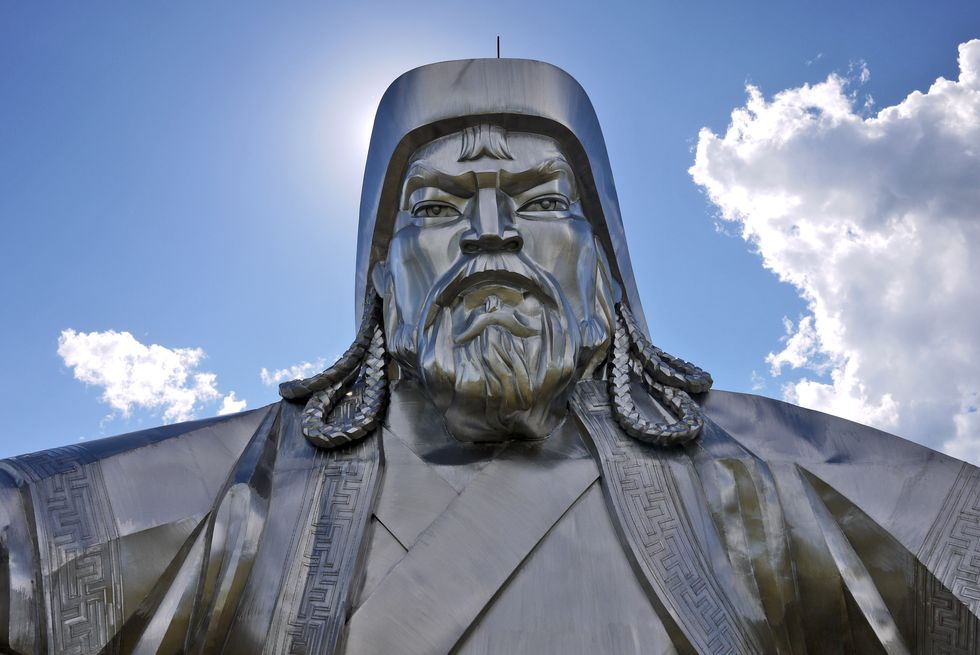The Mongols are arguably one of the most well known nomads in history and have contributed significantly in shaping the world as we know it. Originating in the Central Asian Steppes, they became known for both their brutality and empire building skills, having amassed the largest empire of all time. But without one man, the Mongols would never have been able to reach their great height. This feared individual was Genghis Khan, formerly a clan leader who became the first Great Khan (emperor) of the largest empire to grace this earth.
Genghis Khan was instrumental to the success of the Mongols as he unified the various Mongol clans, facilitated the prosperity of the vast Mongol empire and organized the unique yet deadly military of the Mongols.
Temujin Khan was a young man when he united the warring Mongol tribes. He slowly built strong alliances and set on destroying the tribal system that had for so long prevented the Mongols from unifying, earning the title of Genghis Khan (Universal Ruler) in the process. Unification was a key event in the rise of the Mongols in the 12th century or else they would have continued to war among themselves, ignorant to the rest of the world. The nomadic Mongols were comparatively stronger to their sedentary counterparts, and as such, they could have conquered those civilizations much earlier if they weren't so busy quarreling among themselves. Regardless, Genghis Khan's unification of the Mongols was a feat of its own and laid the groundwork for one of the most influential civilizations in history. It was a turning point that influenced many events, including those that would occur in the centuries to follow.
The Mongols quickly built up their empire through conquest. They were skilled warriors and acquired land at a previously unprecedented pace. However, it was the leadership and administrative abilities of Genghis Khan which lead them to prosperity. He wisely based administrative positions on merit while employing foreign craftsmen and other experts needed. Furthermore, he established a powerful bureaucracy throughout the vast empire and centralized power as the Great Khan. Most important of all, Genghis Khan knew the importance of trade and despite the initial disruption caused by the Mongols, he secured trade routes, thus ensuring peace that would allow trade to thrive. Previously hostile regions became connected to each other through trade, and cross cultural interaction reached its peak. In short, Genghis Khan created the ideal circumstances for trade and interaction by establishing political stability across the vast empire. This long lasting period of trade and cultural diffusion was known as Pax Mongolica, and it heavily influenced the region, forever changing it through the spread of goods, ideas and technologies.
Of course, the Mongol empire was based, initially, at least, on conquest. The Mongols were ferocious warriors and grew infamous for their brutal expansions. However, as strong as the Mongols were, the true reason behind their military success was organization. The Mongols were highly disciplined by their leader, Genghis Khan, who kept trusted kinsmen as generals and rewarded loyalty in order to prevent mutiny. On the other hand, anyone who was caught plotting against the Khan would be swiftly executed. These practices discouraged the military from any form of mutiny and gave them an incentive to perform well through promises of rewards. Genghis Khan sorted his army as intricately as groups of 10 and placed a high standards for troops. In addition, Mongols employed deadly tactics such as surprise attacks and false retreats, quickly overwhelming their enemies. Under Khan, anyone who resisted expansion would be killed and their city would be burned to the ground. The only chance of survival would be to surrender and pay tribute, which was appealing to most. Genghis Khan's organized and highly disciplined military was essential to the expansion of the Mongol empire, and was the fundamental force behind their prosperity.
Genghis Khan played an instrumental role in every necessary step to the rise of the Mongol empire, whether it be unification, organization of the military and overall administration. It can certainly be said that the Mongols wouldn't have gotten far without Genghis Khan, and that, in itself, makes him one of the most influential individuals in history.




















